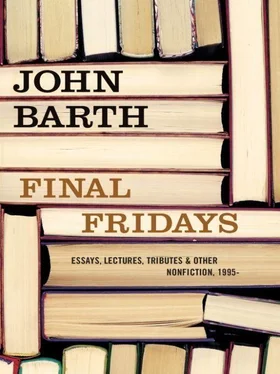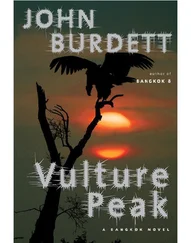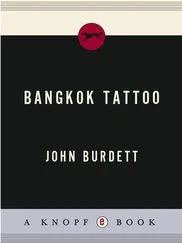TOWARD THE END whereof — while I was visiting-professoring in Boston and deciding to return to Baltimore (though not, I trust, to blissful literary fatuity) — the fellow did me another significant service, a sort of bookend to his having recruited me to Buffalo in the first place. One would prefer to imagine that whatever official recognition one’s writings earn, they earn purely on their literary merits. The world, however, is what it is, and so it did not escape my notice that the five National Book Award jurors in fiction for 1972 included two (Leslie Fiedler and William H. Gass) who had not only spoken favorably of my fiction, but had become personal friends of mine as well, together with one (Jonathan Yardley of the Washington Post ) who had consistently trashed me, and two with whose literary-critical opinions I was unacquainted (the novelists Evan Connell and Walker Percy). I readily and thankfully assumed that it was owing to Fiedler and/or Gass that my Chimera -book was among that year’s nominees; with equal readiness I assumed that that would be that: victory enough to have been a finalist, as had been my bridesmaid fortune twice before. Leslie even telephoned me in Boston from New York to assure me that I hadn’t a prayer, inasmuch as “the other three” judges had favorite candidates of their own. Not long after, news came that Chimera had won the thing after all (more precisely, a divided jury divided the prize).
How so?
“You had two for you and two against you,” Leslie cheerfully confided to me later, “and I drank the swing-vote under the table.”
Owe you one there, pal. Owe you, rather, yet another.
“As Sinuous and Tough as Ivy” (80th birthday salute to William H. Gass)
Another birthday-Festschrift tribute, 1this one to the eminent fictionist, critic, scholar, and teacher William H. Gass, who turned 80 in July 2004. Until his academic retirement in 1999, Gass was Distinguished Professor of Humanities at Washington University in St. Louis, where he also founded and directed the International Writers Center (now renamed the Center for Humanities). Unlike the preceding tributee, Leslie Fiedler, he is as of this writing still very much alive and busy at his art. Two of his essay collections have won National Book Critics Circle awards; the most recent, A Temple of Texts , won the 2007 Truman Capote Award for literary criticism.
NEARLY 40 YEARS ago, in 1966, his then-publisher sent me bound galleys of his first novel, as publishers will, in hopes of testimonial: Omensetter’s Luck , by one William H. Gass.
Never heard of the chap, although I should have: His fiction had already been included in The Best American Short Stories in 1959, 1961, and 1962. Anyhow, my vows to the muse prohibit, among other things, the blurbing of blurbs except for first books by my former students. All the same, I opened the thing (in the middle, unfairly), scanned a page or two in each direction, and found — in a passage describing a midwestern country picnic — these images: “All kinds of containers sat about the table in sullen disconnection. Some steamed despite the hot day; others enclosed pools of green brine where pickles drowsed like crocodiles.”
Well, now, I thought: Imagine a professor of philosophy (so the jacket-note identified the author) who can write pickles drowsed like crocodiles . I was impressed enough to rebegin at the beginning and read the novel right through, more and more wowed as I went along. Wrote the author a fan letter, even, in lieu of blurb. Turned out he liked my stuff, too — some of it, anyhow — and there ensued a decades-long cordial comradeship-in-literary-arms. Membership in the dimly-defined ranks of our peaceable platoon was a matter less of voluntary enlistment than of assignment by reviewers and critics praising, blaming, or merely tabulating the Usual Suspects of “Postmodernism,” “Metafiction,” or whatever, and having thus been called to one another’s attention, we-all most often enjoyed and admired one another’s writings.
Enjoyed too our professional path-crossings through the remainder of the century: at one another’s universities (most though not all of us were professors, typically though not necessarily of literature and/or its writing), at conferences and other literary functions here and there in our republic and abroad. As Omensetter was followed by the story-collection In the Heart of the Heart of the Country (which I liked even more than its so-impressive predecessor) and that by Willie Masters’ Lonesome Wife (which if possible I enjoyed more yet: the most formally sportive item in Gass’s oeuvre) and the several splendid essay-collections, I came to know their author a bit, sharing reading/ lecture platforms with him in Buffalo, St. Louis, and Baltimore, in New York and North Dakota, in Germany and in Spain. Admired his presence, onstage and off. Admired his formidable intelligence and learning, his commitment to teaching (“I’ll probably keep at it till I drop,” he remarked to me upon my own academic retirement in 1995, “and then I’ll have myself stuffed and go on teaching”), his obiter dicta (“I’ll never do a fiction-writing workshop,” he once vowed to me: “When I’m reading a bad student paper on Plato, at least I’m thinking about Plato; but when I’m reading a bad student short story about trout fishing, I’m not thinking about anything. ”).
Admired and admire most of all, of course, the writing: in the fiction, those inhospitable landscapes and typically pathetic-when-not-monstrous characters, marvelously rendered into language; in the essays, the play of mind and wide-ranging erudition lightly deployed. And in both, the prose, the prose — in particular (if I were obliged to single out one element or aspect for special commendation, which I am not but nevertheless will) the similes : those homely yet showstopping similes, still the Gass trademark for this admiring reader, which stick in my memory long after I’ve forgotten which work they’re from and what subtle additional relevances they no doubt have to their context. A character’s hands “quick as cats,” drafts of air that “cruise like fish through the hollow rooms,” a feeling “like the loneliness of overshoes or someone else’s cough,” a face “like a mail-order ax,” “wires where sparrows sit like fists,” an argument “as sinuous and tough as ivy”—and those drowsing pickles….
One can sieve troves of such gems from Gass’s pages. Indeed, the narrator of “In the Heart of the Heart of the Country” self-deprecatingly remarks, “Similes dangle like baubles from me.” Not so: A Bill Gass simile does not dangle; it is of a piece with the cadence of its sentence, the stuff of its speaker, the situational moment. And it is no bauble, but an unostentatious gemstone: a diamond not really in the rough, but cunningly polished to look rough, if you follow me. A Bill Gass simile is like. . is like. .
TO THE RESCUE, maestro !
The Last Introduction (memorial tribute to Joseph Heller)
Three times, at approximate 10-year intervals, it was my pleasure to introduce Joseph Heller to university audiences: first in the tempestuous High 1960s at the State University of New York at Buffalo, and twice later — in the post-Nixon 1970s and again in the twilight of the Reagan ’80s — at Johns Hopkins. These professional path-crossings, along with our having each taught earlier at Penn State in our apprentice days and been often subsequently categorized together as “Black Humorists” back when that label was in fashion, added an extra fillip of literary comradeship to our cordial acquaintance, despite whatever differences between Joe’s muse and mine. What follows is adapted from the last of those three introductions, delivered on October 4, 1988, when Joe and his wife Valerie were book-touring for his just-published “Rembrandt” novel, Picture This . Upon Joe’s death 11 years later (in December 1999, at age 76), Valerie Heller projected a volume of memorial tributes to her husband from sundry of his friends and associates, and in keeping with our established pattern of one Heller-intro per decade, I contributed this one. If introductions had titles, I would call it
Читать дальше












